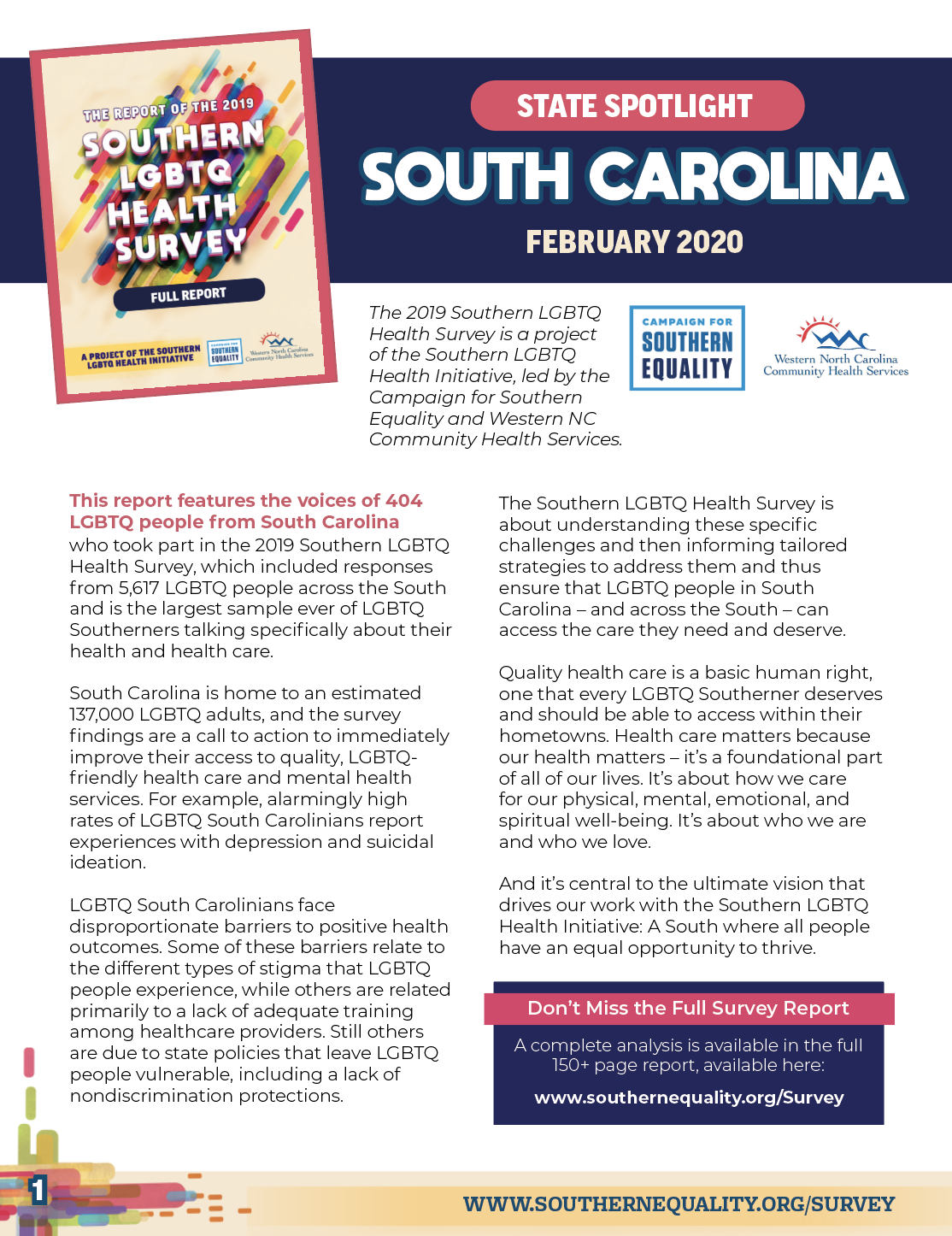As the nation’s attention turns to South Carolina days before its presidential primary, new research about LGBTQ health in the state provides insights into health disparities and urgent needs around mental health and access to health care.
Today the Campaign for Southern Equality (CSE) and Western North Carolina Community Health Services (WNCCHS) released a new report about LGBTQ health in South Carolina, as a supplement to The Report of the 2019 Southern LGBTQ Health Survey.

More than 400 LGBTQ people in South Carolina and more than 5,600 people across the South took part in the 2019 Southern LGBTQ Health Survey – the largest sample ever of LGBTQ Southerners talking specifically about their health and healthcare. The report released today provides new insights into the health disparities that LGBTQ people in South Carolina experience.
South Carolina is home to more than 137,000 LGBTQ adults and key findings of this South Carolina supplement – which you can read here – include:
- More than half of respondents in South Carolina reported fair or poor mental health, and two-thirds of transgender respondents rated their mental health as fair or poor. Reported rates of several mental health challenges were much higher among South Carolina respondents than in the total sample; these included people who have experienced suicidal ideation (33%, compared to 26% in the full sample), depression (71%, compared to 55% in the full sample), and anxiety (63%, compared to 46% in the full sample).
- Respondents in South Carolina had the highest rate in any state of not knowing their HIV status, with 13.8% of respondents saying that they do not know (compared to 10% in the full sample). Nearly 40% of respondents in South Carolina said they have never been tested for HIV.
- More than half (51.5%) of all South Carolina respondents and nearly three-quarters (72.7%) of transgender respondents in South Carolina said they feel that being in the South always or often makes it harder to access quality medical care for LGBTQ individuals.
 Rev. Jasmine Beach-Ferrara, Executive Director of the Campaign for Southern Equality, said:
Rev. Jasmine Beach-Ferrara, Executive Director of the Campaign for Southern Equality, said:
“These heartbreaking statistics about the LGBTQ community in South Carolina are a call to action. LGBTQ people live in every corner of South Carolina and deserve to have access to the health care they need in their hometown. There’s an urgent need for health care providers, advocates, and policy makers to work together to create a South Carolina where LGBTQ people can access quality care and are also equal under the law.”
Ivy Hill, Community Health Program Director of Campaign for Southern Equality, said:
“This new report underlines that LGBTQ people in our state are facing major challenges – and that these challenges are exacerbated for transgender respondents at almost every turn. As a lifelong South Carolinian and a transgender leader in our state, I know firsthand what’s at stake, and I know how strong and resilient our community is. There’s no question that we need to improve the health experiences of LGBTQ people in South Carolina, and that will require institutions investing in LGBTQ trainings, providers more deeply understanding the community, and all South Carolinians discussing these issues.”
Led by a team of LGBTQ Southerners, the Southern LGBTQ Health Survey was rooted in community-based research methods, including working with a team of Survey Ambassadors who spanned the region and who included a minister, a nightclub promoter, and grassroots leaders. The project is part of the Southern LGBTQ Health Initiative, a collaboration of CSE and WNCCHS to improve access to LGBTQ-friendly primary care, HIV care and support services across the South. In addition to community-based research, this initiative involves training primary care providers in affirming health care practices and providing direct funding to grassroots groups leading innovations in access to LGBTQ health care.
Access the South Carolina state supplement for the Southern LGBTQ Health Survey – as well as the full report and executive summary in English and Spanish at www.southernequality.org/Survey.

